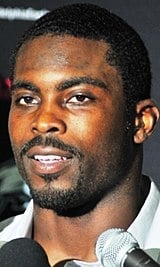You have /5 articles left.
Sign up for a free account or log in.

Michael Vick
Wikipedia
After Virginia Tech announced it would induct Michael Vick into its athletic Hall of Fame, criticism poured in over the honor going to someone with his criminal history.
But outside Vick’s conviction for his connection to a dogfighting ring, many also pointed out that Vick never graduated from Virginia Tech. Though undoubtedly Vick elevated its football program and reaped significant cash in a professional career that might never have been possible without his time as a Hokie, he only attended the university for two years, from 1998 to 2000.
Vick’s status as a nongraduate calls into question the appropriateness of honoring him and others like him -- those athletes who might generate prestige for an institution, but who don’t actually earn degrees. Many in academe have for years panned colleges and universities for prioritizing athletes’ prowess on the field rather than focusing on them as students.
The university’s announcement on Vick did not mention his 2007 conviction or his failure to graduate from Virginia Tech.
An online petition to rescind Vick’s honor was signed by more than 82,000 people as of Friday.
Though most of the people who commented on the petition focused on Vick's dogfighting past, some also addressed his academic record.
Patricia Jones, from San Diego, wrote, "He didn't graduate from there! Why does he deserve the honor?"
"I am signing because this is wrong," another user wrote. "He didn't graduate is bad enough but the fact that he is a really bad person with no morals and values [sic]. You do not fight dogs, it is inhumane."
Asked about Vick not graduating, representatives of the university emailed a statement.
Mr. Vick’s induction into the university’s sports Hall of Fame acknowledges his tremendous achievements as a student athlete -- who some will say was the greatest in the history of the university. We understand that there are those who do not and will never agree with this decision. In considering Mr. Vick’s nomination to our sports Hall of Fame, the criminal activities in which he engaged, his subsequent conviction and time he served for his crime were also considered, and it was informed by the remorse he has shown since that conviction, the work he is currently engaged in to advance animal welfare issues, as well as his efforts to help our current student athletes, based on lessons he’s learned in his own life, make positive choices as they begin their adult lives. This in no way condones the actions for which he was convicted. The university remains dedicated to the protection of animal health and welfare and embodies great care and compassion for all living animals.
Vick raised Virginia Tech “to a whole other level” during his time there, said Jon Solomon, editorial director of Aspen Institute’s Sports and Society Program. Solomon said he understands those who agree with Vick’s inclusion in the Hall of Fame, because he permanently changed the athletic culture at Virginia Tech.
But it’s a culture that, as at institutions across the country, has trended more toward the model of professional leagues, Solomon said.
“College sports definitely don’t want to hear that, but when you have billion-dollar deals and multimillionaire coaches, you have these players only to go to make this stop in college to play football. Absolutely a degree is incredibly important, but it’s not always how the players do it.”
Dave Ridpath, president of the Drake Group, which pushes for academic integrity in collegiate athletics, said he believes athletes should meet certain criteria -- such as graduation -- before being honored by a sports Hall of Fame.
“I think it’s very tough to honor him, and the fact that he hadn’t graduated,” Ridpath said. “Even if he had graduated, if I was in that situation, and I was the Virginia Tech administration, I would not induct him into the Hall of Fame.”
Ridpath pointed out that the institution where he teaches, Ohio University, doesn’t allow athletes into the Hall of Fame without a bachelor’s degree from some institution.
Gary Trent, the lauded former professional basketball player and Ohio University alumnus, was inducted several years ago, after he earned a degree, Ridpath said. He said he thought that this was the rule, not the exception.
A representative from the National Collegiate Athletic Association did not respond to a request for comment on institutional or conferencewide stipulations for entering halls of fame.
Virginia Tech's decision to honor a dropout is not without precedent.
The University of Texas at Austin retired the jersey of one of its most famed former students, Kevin Durant of the NBA’s Golden State Warriors, in 2009, even though he never graduated. Durant was part of the "one and done" trend, in which an athlete only plays one season in college before moving to professional sports.
The University of Kentucky, likewise, added Washington Wizards player John Wall to its Hall of Fame last month despite Wall only playing a single season at Kentucky.
Some feel that Vick’s inclusion is not at all problematic. Colleges and universities are not solely designed to produce students with degrees, but to ensure they contribute to society in some way, said Gerald Gurney, past president of the Drake Group and an assistant professor of adult and higher education at the University of Oklahoma.
“I don’t see the fact that whether or not they graduated the most relevant fact,” Gurney said.
He said he does disagree with the “one-and-done” phenomenon because it highlights that the athletes’ status as students is secondary.
But companies like Microsoft and Facebook were both founded by college dropouts, Gurney said -- indeed, both Bill Gates and Mark Zuckerberg skipped out of Harvard University early, but both are among the wealthiest men in the world.
Academic accomplishments are important, but they shouldn’t overshadow “what kind of citizen” a person is, and shouldn’t disqualify them from rewards, Gurney said.
“I have seen many examples of individuals who make tremendous contributions to their cities, their university, some even the world, who have, in fact, not graduated,” he said.




